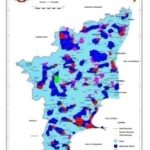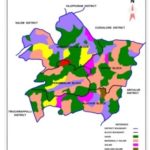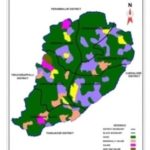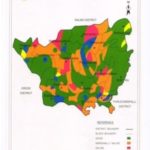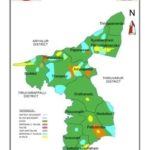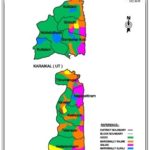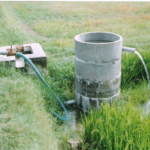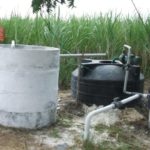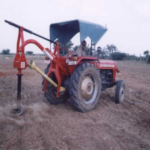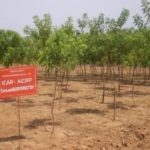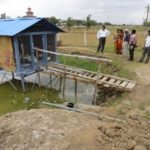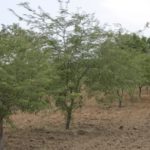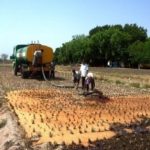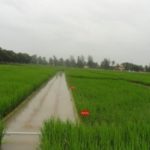Technology Development
Technology developed in different areas
The following are the research accomplishments of this department.
- Salt affected soil map of Tiruchirappalli District
The salt affected soils map of Tiruchirappalli District was prepared at 1:50,000 scale using remote sensing data and ground truth verification. The results revealed that out of the total geographical area of 4,40,412 ha, 7,362 ha are slightly salt affected, 10,729 ha are moderately salt affected and 64 ha are strongly salt affected.
- Survey and mapping of ground Water quality of Tamil Nadu
The water quality map of Tamil Nadu was prepared with the available data in 1:250,000 scale. It showed that 73.2% of water samples were found to be of good quality, 21.1% moderately saline and 5.7% were saline.
Perambalur district
In Perambalur district, 52.4 % is coming under good quality, 26.8 is marginally saline, 10.9 % is marginally alkaline, 5.9 % is alkaline, 3.2 % is saline and 0.88 % is high SAR Saline
Ariyalur District
Among the total samples collected from Ariyalur district, 67.8 % is coming under good quality, 6.35 is marginally saline, 19.9 % is marginally alkaline, 3.54 % is alkaline, and 2.04 % is saline.
Namakkal district
Among the total samples collected from Namakkal district, 62.3 % is coming under good quality, 27.1 is marginally saline, 6.5 % is marginally alkaline, 1.9 % is alkaline, and 8.5 % is saline.
Tanjore district
Out of the total samples collected in Tanjore district, 84.2 % is coming under good quality, 2.19 % is marginally saline, 9.3 % is marginally alkaline, 3.6 % is alkaline, 0.46 % is saline and 0.25 % high SAR saline.
Thiruvarur district
Out of the total samples collected in Thiruvarur district, 83.2 % is coming under good quality, 9.93 % is marginally saline, 3.72 % is marginally alkaline, 1.24 % is alkaline, 0.62 % high SAR saline and 1.24% highly alkaline.
Nagapattinam district
Out of 215 samples collected in Nagapattinam district, 72.6 % is characterized under good quality, 12.7 % is marginally saline, 7.8 % is saline, 2.9 % is marginally alkaline, 2.9 % is alkaline, and 0.4 % high SAR saline.
- Gypsum bed technology for alkali water treatment
- Four RCC rings of 3 ft. diameter are joined to achieve a structural dimention of 4 ft. height.
- Iron mesh is provided in between third and fourth ring
- The structure is closed at bottom having inlet in the bottom ring and outlet in the upper most ring.
- Gypsum tied in cloth bags is placed on the iron mesh
- The Residual Sodium Carbonate of alkali water is reduced from 6.75 to 3.2 meq. /l
- Cost per unit is Rs. 3000/-
- Drip irrigation to vegetables in alkali soil using amended alkali water
- An increase of 12.7 % in Okra and 22.1 % in cluster bean was recorded due to soil application of gypsum @ 50 % GR.
- Soil application of gypsum @ 50 % GR along with drip irrigation of spentwash mixed water recorded the highest Okra yield
- Soil application of gypsum @ 50 % GR along with drip irrigation of gypsum bed treated water recorded the highest yield of clusterbean.
- Conjunctive use of canal and sodic water on rice based cropping system
- Conjunctive use of canal water for rice and alkali water for greengram is recommended for New Kattalai Canal of Cauvery irrigation command area.
- When there is a shortage or limited water supply in canal, conjunctive use of canal and sodic water in 1:1 cyclic mode can be practiced for rice.
- Gypsum bed treatment of alkali water reduces its RSC from 6.35 to 2.12.
- Reclamation of alkali soil by Gypsum Technology
- A mass reclamation of alkali soils of Manikandam block of Tiruchirapalli district was undertaken for reclamation of alkali soils in an area of 1800 ha.
- The technologies prescribed were gypsum application @ 50 % GR and leaching with canal water, growing green manures like daincha and incorporation, application of ZnSO4 @ 40 kg/ha and transplanting salt tolerant rice varieties like TRY-1 / CO 43.
- The mass reclaimed fields are being monitored continuously for the changes in physico-chemical properties. The ESP of the mass reclaimed soils ranged between 18 and 32 during 2009-10.
- Sodic Soil Reclamation Technology using Distillery Spentwash
- Plough the land, level and form compartments of
about 25 cents each.
- Apply distillery spentwash evenly on land surface.
- Allow for natural oxidation and plough the land twice
or thrice after 30 days.
- Impound best available water and puddle the field.
- Drain the impounded water after 24 hours.
- Repeat the process twice.
- After 45days, transplant salt tolerant rice varieties such as TRY-2, TRY-1, CO-43.
- During first year, 50 per cent of nitrogen and 100 per cent of potassium can be saved.
- One time application of raw DSW @ 375 to 500 m3 ha-1 for the reclamation of calcareous alkali soils
- Alternate land use system under rainfed alkali soils Agro forestry
- Planting alkali tolerant tree crops: Tamarind, neem, subabul, Acacia, Prosopis, Amla, Hardwicia binata
- Pit holes- using post-hole augers of 30 cm dia and to a depth of 90 cm or pits of 1’ x 1’ x 1’
- Fill the pits with native soil, and gypsum @ 50% GR or native soil with distillery spent wash @ 150 mL kg-1 soil.
- Integrated Farming System suitable for problem soil areas of Tamil Nadu
In comparison with a pure crop program for 0.40 ha, the IFS program (0.30 ha for crop and 0.10 ha for poultry and fisheries) has yielded high net returns and BC ratio of 2.36 which is 1.33 higher than the crop alone program.
- PPFM strains isolation
In Agrl. Microbiology unit of dept of Soil Science and Agrl. Chemistry, PPFM strains were isolated from different plants and efficient PPFM strains for drought tolerance and growth promotion were identified.
- Isolation of Zinc solubilizing bacterial cultures
The efficient zinc solubilizing bacterial cultures from different plant rhizosphere was isolated and the efficient strains were identified.

